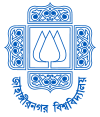
Md. Ashadullah, PhD Associate Professor, Department of Management Studies
PROFILE
SHORT BIOGRAPHY
Md. Ashadullah, Ph.D. is an Associate Professor at the Department of Management Studies, Jahangirnagar University, Dhaka, Bangladesh. He has over 15 years of professional experience in Higher education teaching and research in Bangladesh. Before joining the teaching profession, he completed his Bachelor's and Master's degree from the Department of Management, University of Dhaka. Subsequently, he achieved a Bachelor of Laws from the National University, Bangladesh. He is a member and life member of the Japanese Association for South Asian Studies, and Dhaka University registered graduate respectively. He is also a fellow of the Bangladesh Society for Human Resources Management. He holds a doctoral degree in policy science from the Graduate school of Policy Science at Ritsumeikan University, Japan, and was a MEXT scholar. His research area is broadly categorized in industry competitiveness, Child rights and labour issues, sustainability, compliance, and business policy issues. He can be reached at ashadullah.bd@gmail.com.
RESEARCH INTEREST
Industrial Competitiveness, Business Sustainability, Compliance and International Labor Standards, Decent work and working environment, Employment and Labor Law, Human Resource Development, Competitiveness and Sustainability Analysis of the apparel industry in Bangladesh and Asia, Post-LDC challenges.
For more information, please visit the following URLs...
https://www.researchgate.net/profile/Md-Ashadullah
https://scholar.google.com/citations?user=CuE_iVcAAAAJ&hl=en&oi=ao
https://www.linkedin.com/in/md-ashadullah-phd-08130b1b/
JOURNAL PAPER
Ashadullah, Md., State of Compliance of Bangladesh's Readymade Garment Industry during the COVID-19 Pandemic: A Pathway to Future Challenges, Jahangirnagar University Journal of Management Research, 6, pp.103-117, 2023. doi: http://doi.org/10.59185/jujmr.v6i1.12Abstract: The readymade garment (RMG) industry is the backbone of Bangladesh's economy, accounting for over 80% of the country's export earnings, which employs over 4 million workers. However, the COVID-19 pandemic has significantly impacted the industry's operations due to supply chain disturbances, reduced consumer demand, and factory closures. This study aims to investigate the state of compliance of the Bangladesh RMG industry during the COVID-19 pandemic, focusing on encountering future challenges. This study surveyed 100 RMG workers to evaluate the 36 compliance issues the government of Bangladesh has already termed as the most important for the industry. The study used a combination of primary and secondary data sources. The study showed that occupational health and safety issues during the COVID-19 pandemic were fantastic, where some issues, including working hours, payment of wages, and conditions of service, were identified as significant non-compliant issues that required further improvement. The findings of this research will provide insights into the challenges and opportunities for the Bangladesh RMG industry in the post-pandemic era and provide some policy guidelines as a pathway to face upcoming challenges.
Keywords: Compliance, RMG, COVID-19, Workplace Safety, Labor Standards
Ashadullah, M., & Oda, H., Investigation on Compliance in Ready-made Garment Factories in Bangladesh, BUFT Journal of Business and Economics, 2, pp.1–19., 2021.Abstract
Purpose: The objective of the study is to examine the compliance situation of Bangladesh's ready-made garment (RMG) factories. Methodology: For the analysis, survey data was collected from 88-export oriented RMG factories in Dhaka, the capital city of Bangladesh, and surrounding districts, including Gazipur and Narayanganj. Two workers from each factory were interviewed to explore the factory’s compliance status. The interviews took place from August to September 2019. The survey questionnaire used the main questions from the compliance assessment tool developed by the International Labor Organization, which contains various issues in compliance with international standards and national legislation. Findings: The study found that Bangladesh's RMG factories' compliance situation, especially the working environment, is improving. However, a highest level of non-compliance has been found in some areas such as trade union issues, payment of overtime, voluntary overtime issues, regular working time, leave facilities, and so on. Hence, significant improvement in these compliance issues is necessary. Limitations: This study has focused on the compliance issues of RMG factories from the workers' perspective. Hence, there is a scope for further study to measure the compliance situation of the RMG factories from the viewpoint of stakeholders. Practical Implication: This study discloses significant aspects of the compliance status of Bangladeshi RMG factories. The findings will provide inputs for policy design aimed at improving the factories’ compliance situation with the international standards. Originality: This study is particularly focused on compliance issues by using ILO formulated assessment tools and one of the studies in the area of Bangladesh RMG factories.
Keywords: Compliance, Labor Standard, Working Environment, Ready-made Garment Industry, Bangladesh
Ashadullah, M., An Analysis of Market Positioning and Competitiveness of Bangladesh’s Ready-Made Garment (RMG) Sector: Issues for Export Sustainability, Journal of Regional Information and Development, 10, pp.1–14, 2021.
Abstract:
The purposes of this study are to examine the market position of Bangladesh’s ready-made garment (RMG) products in world exports and analyze its competition with newcomers. Data used are from the Standard International Trade Classification Revision 3 of the United Nations Comtrade database (UN Comtrade) for the period from 2000 to 2015. The empirical analysis employed the method of market positioning matrix (MPM) (Lall and Weiss, 2004) to assess the current position of RMG commodities in the world market, and the normalized revealed comparative advantage (NRCA) index (Yu et al., 2009) to examine international competition with newcomers. The analysis identified that Bangladesh’s top three RMG commodities are “achievers in adversity,” meaning that the export shares of these commodities in the global market increased during this period, even though the growth of the markets for these commodities was stagnant. This implies that the scope for further export expansion of these commodities is limited. The study also reveals that new entrants such as Vietnam and Cambodia have rapidly increased their export shares and their export competitiveness of RMG products. Since the market of the above RMG commodities is not growing faster and newcomers are increasing their competitiveness, this raises a question about the export sustainability of Bangladesh’s RMG commodities. To maintain its position in the global market, Bangladesh’s RMG sector should develop and export higher value-added RMG commodities. Since Bangladesh’s exports depend heavily on limited RMG products, the fall of RMG exports will be detrimental not only to Bangladesh’s export earnings but also to its national economy. Export diversification is absolutely necessary; hence, adequate policies should be implemented.
Keywords: Market Positioning, Export Sustainability, International Competition
Ashadullah, M., An Empirical Analysis of the Competitiveness of the Bangladesh Ready-made Garment Sector: The Impact of the MFA Phase-out and the Rana Plaza Collapse on Export Competitiveness, Policy Science, 28(1), 79–95, 28, 1, pp.79–95, 2020.Abstract
The objective of this study is to examine the competitiveness of the Bangladesh ready-made garment (RMG) sector. Specifically, it analyzes how the competitiveness of the top five RMG commodities was affected by two events: the Multi-Fibre Arrangement (MFA) phase-out in 2004 and the Rana Plaza collapse in 2013. The RMG sector is the most important contributor to the Bangladesh economy since its beginnings in the early 1980s. At present, Bangladesh is the world’s second largest RMG-exporting country, behind China. The top five RMG commodities accounted for more than 80% of the country’s total exports in 2015. Currently, the sector employs over 4 million workers, with the majority being women who migrated from rural areas. This employment has contributed to the reduction of rural poverty. Thus, it is critically important for the Bangladesh economy to maintain its competitiveness in the export of RMG to the world market. The empirical analysis employs the normalized revealed comparative advantage (NRCA) index, which is built on Balassa’s revealed comparative advantage (RCA) index (Balassa, 1965). Data were obtained from the UN Comtrade and classified by the three-digit level of the Standard International Trade Classification (SITC) revision 3 for the period from 1995 to 2015. Empirical evidence reveals that the top five RMG commodities achieved significant competitiveness in terms of the NRCA value and export share.They continue to remain competitive in the world market even after the MFA phase-out and the Rana Plaza collapse. The study also confirms the significant presence of Bangladesh’s RMG sector in the world market. After discussing the status of the Bangladesh RMG sector in the world market, some policies for maintaining competitiveness are presented.
Keywords: Competitiveness, MFA phase-out, Rana Plaza collapse, Normalized Revealed Comparative Advantage
(NRCA), Bangladesh RMG
Hossen, Md. Miraj, Ashadullah M., & Islam, Rashedul, Green Human Resource Management Practices in Bangladesh: A Study on the Banking Sector, The Jahangirnagar Journal of Business Studies, 7, 1, pp.81-98, 2018.
CONFERENCE PAPER
Ashadullah, M., An Empirical Analysis of the Competitiveness of the Bangladesh Ready-made Garment Sector: The Impact on the Competitiveness of MFA Phase-out and Rana Plaza Collapse, The 33rd Japanese Association for South Asian Studies Annual Conference, Japan, October 3-4, 2020..Teaching
| Course Code | Course Title | Semester/Year |
|---|---|---|
| EMBA 510, MGT 202, MGT 207 | Business Ethics & Legal Environemnt, Legal Environmnet of Business I & II | 2022, 2023 |
| Business and Society, Industrial Law & Relations | 2022 | |
| MGT-101 | Principles of Management, Human Resource Management | 2023 |
| HRM-506/EHRM-519, HRM 501/EHRM 514 | Training and Development, Human Resource Planning, International Human Resource Management | 2022, 2023 |
Academic Info
Period: 2018-2021
Doctor of Philosophy (Ph.D), 2021
Specialization in Policy Science
Competitiveness, Sustainability, and Compliance of Bangladesh Apparel Industry
Period: 2007-2009
Bachelor of Laws (LL.B), 2009
Specialization in Labour and Industrial Law
Period: 2004-2005
Master of Business Administration (MBA), 2005
Specialization in Human Resource Management
Period: 2000-2004
Bachelor of Business Administration (BBA), 2004
Specialization in Management
Activity
Position: Trainer/Speaker
Period: May 07, 2024
"Managing human resources at the workplace" under the "Office Management" training course
Position: Student Adviser
Period: September 2022 to August 2023
Position: Member
Period: June 2022 to July 2023
Position: Director
Period: August 2023 to present
Position: Chairman
Period: September 28, 2023 to Present
Position: Member, Editorial Board, Jahangirnagar University Journal of Management Research (JUJMR) , Volume 6
Period: 2023
Position: MEXT Scholar at Ritsumeikan University, Japan.
Period: 2018-2021
Position: Fellow
Period: 2021 to date
A national-level professional organization devoted to human resources professional development and fostering relations between industry and academia in Bangladesh and other parts of the world
Position: Member, Trusty Board
Period: 2011 to Date
A voluntary organization devoted to social development in Bangladesh including child education, adult education, women empowerment, library development, and tree plantation
Position: Member
Period: 2020 to present
Position: Life Member
Position: Member, Program Self Assessmnet Committee (PSAC)
Period: 2021 to date
Position: HR Specialist/Trainer
Period: 22/12/2022. 12/04/2023
# Conducted training on HRD, Human Resource Planning, the Needs and benefits of HRD, diffreence between Management, HRM and HRD, Case study related to HRM/HRD to the mid Level engineers and officers of BPDB, Dhaka
# Conducted training to senior officials of BPDB about the "Motivation at Workplace".
Position: Editor, Jahangirnagar University Journal of Management Research (JUJMR) , Volume 5
Period: 2022-23
Position: Students' Adviser
Period: Septemtber 2022 - August 2023
Contact
Md. Ashadullah, PhD
Associate Professor
Department of Management Studies
Jahangirnagar University, Savar, Dhaka-1342, Bangladesh.
Work Phone: PABX: 02224491045-51/1697
Email: ashadullah.bd@juniv.edu
, ashadullah.bd@gmail.com

